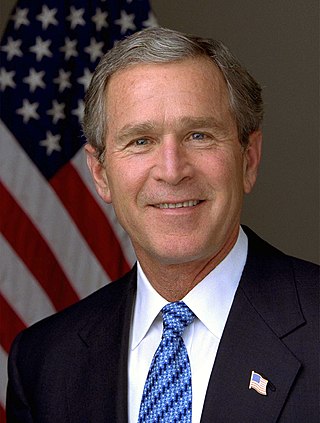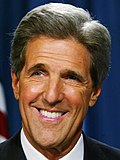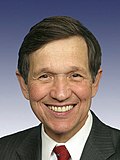
The 1968 United States presidential election was the 46th quadrennial presidential election, held on Tuesday, November 5, 1968. The Republican nominee, former vice president Richard Nixon, defeated both the Democratic nominee, incumbent vice president Hubert Humphrey, and the American Independent Party nominee, former Alabama governor George Wallace. This was the last election until 1988 in which the incumbent president was not on the ballot.

The 1984 United States presidential election was the 50th quadrennial presidential election held on Tuesday, November 6, 1984. Incumbent Republican president Ronald Reagan defeated Democratic former vice president Walter Mondale in a landslide victory.

From January 14 to June 8, 2004, voters of the Democratic Party chose its nominee for president in the 2004 United States presidential election.

The 2008 United States presidential election was the 56th quadrennial presidential election, held on November 4, 2008. The Democratic ticket of Barack Obama, the junior senator from Illinois, and Joe Biden, the senior senator from Delaware, defeated the Republican ticket of John McCain, the senior senator from Arizona, and Sarah Palin, the governor of Alaska. Obama became the first African American to be elected to the presidency, as well as being only the third sitting United States senator elected president, joining Warren G. Harding and John F. Kennedy. Meanwhile, this was only the second successful all-senator ticket since the 1960 election and is the only election where both major party nominees were sitting senators. This was the first election since 1952 in which neither the incumbent president nor vice president was on the ballot.

From January 19 to June 8, 2004, voters of the Republican Party chose its nominee for president in the 2004 United States presidential election. Incumbent President George W. Bush was again selected as the nominee through a series of primary elections and caucuses culminating in the 2004 Republican National Convention held from August 30 to September 2, 2004, in New York City.
The following is a timeline of major events leading up to and immediately following the United States presidential election of 2008. The election was the 56th quadrennial United States presidential election. It was held on November 4, 2008, but its significant events and background date back to about 2002. The Democratic Party nominee, Senator Barack Obama of Illinois, defeated the Republican Party's nominee, Senator John McCain of Arizona.

The South Carolina presidential primary is an open primary election which has become one of several key early-state presidential primaries in the process of the Democratic and Republican Parties choosing their respective general election nominees for President of the United States. South Carolina has cemented its place as the "First in the South" primary for both parties.

Super Tuesday II, 2008 is the name, for 4 March 2008 the day on which the second largest simultaneous number of state presidential primary elections was held for the 2008 presidential election cycle. On this day, Mike Huckabee withdrew from the race when John McCain won enough delegates to claim the Republican nomination for president. It was the second Super Tuesday election of 2008 and took place approximately one month after the first Super Tuesday of this election. The Democratic primaries saw 444 delegates selected on this date, with 265 delegates in the Republican primaries.

The 2004 Oklahoma Democratic presidential primary, part of the process of selecting that party's nominee for President of the United States, took place on February 3, one of the seven nominating contests of 2004's "Mini-Tuesday". The primary election chose 40 pledged delegates to represent Oklahoma at the 2004 Democratic National Convention. The remainder of Oklahoma's 47 delegates consisted of unpledged superdelegates not bound by the results of the primary. The election was a closed primary, meaning that only registered Democrats could vote in this election. Wesley Clark won the primary by a razor-thin margin over John Edwards.

The 2004 California Democratic presidential primary was held on March 2, 2004, the same day as the Republican primary. Senator John Kerry overwhelmingly won the primary over rivals Senator John Edwards, Congressman Dennis Kucinich, and Reverend Al Sharpton. The primary was open to both registered Democrats and unaffiliated voters. 440 delegates were at stake, with 370 tied to the March primary.

The 2008 United States presidential election in New Jersey took place on November 4, 2008, and was part of the 2008 United States presidential election. Voters chose 15 representatives, or electors to the Electoral College, who voted for president and vice president.

Presidential primaries and caucuses were organized by the Democratic Party to select the 4,051 delegates to the 2016 Democratic National Convention held July 25–28 and determine the nominee for president in the 2016 United States presidential election. The elections took place within all fifty U.S. states, the District of Columbia, five U.S. territories, and Democrats Abroad and occurred between February 1 and June 14, 2016.
The following is a timeline of major events leading up to, during, and after the 2016 United States presidential election. The election was the 58th quadrennial United States presidential election, held on November 8, 2016. The presidential primaries and caucuses were held between February 1 and June 14, 2016, staggered among the 50 states, Washington, D.C., and U.S. territories. The U.S. Congress certified the electoral result on January 6, 2017, and the new President and Vice President were inaugurated on January 20, 2017.
This article includes the entire 2016 Democratic Party presidential primary schedule in a format that includes result tabulation. Below are the vote totals for everyone that appeared on the ballot during the 2016 Democratic presidential primaries. Two candidates, Bernie Sanders and Hillary Clinton, appeared on all 57 ballots. Two others, Martin O'Malley and Rocky De La Fuente, appeared in over 30 states and six others appeared on between two and ten states. Nearly 20 appeared on only New Hampshire's ballot. As of June 8, Hillary Clinton was considered the presumptive nominee according to media organizations. On July 26, the second day of the Democratic National Convention, Clinton was confirmed the Democratic nominee for the 2016 United States presidential election.

Presidential primaries and caucuses were organized by the Democratic Party to select the 3,979 pledged delegates to the 2020 Democratic National Convention held on August 17–20 to determine the party's nominee for president in the 2020 United States presidential election. The elections took place in all 50 U.S. states, the District of Columbia, five U.S. territories, and through Democrats Abroad, and occurred between February 3 and August 11.

The 2020 United States presidential election in New York was held on Tuesday, November 3, 2020, as part of the 2020 United States presidential election in which all 50 states plus the District of Columbia participated. New York voters chose electors to represent them in the Electoral College via a popular vote, pitting the Republican Party's nominee, incumbent President Donald Trump, and running mate Vice President Mike Pence against Democratic Party nominee, former Vice President Joe Biden, and his running mate California Senator Kamala Harris. New York had 29 electoral votes in the Electoral College. Trump announced that Florida would be his home state for this election, rather than New York as it had been previously. This was the first presidential election in New York to allow no-excuse absentee voting.

The 2020 New York Democratic presidential primary took place on June 23, 2020 alongside the Kentucky primary, as part of the Democratic Party primaries for the 2020 presidential election. It was originally planned to take place on April 28, 2020, as one of several northeastern states in the "Acela primary", but was postponed due to the COVID-19 pandemic. The New York primary was a closed primary, with the state awarding 324 delegates to the 2020 Democratic National Convention, of whom 274 were pledged delegates allocated on the basis of the primary results.
Debates and forums took place between candidates in the campaign for the Democratic Party's nomination for the president of the United States in the 2004 presidential election. The Democratic National Committee sanctioned 6 debates out of 16 total.

















